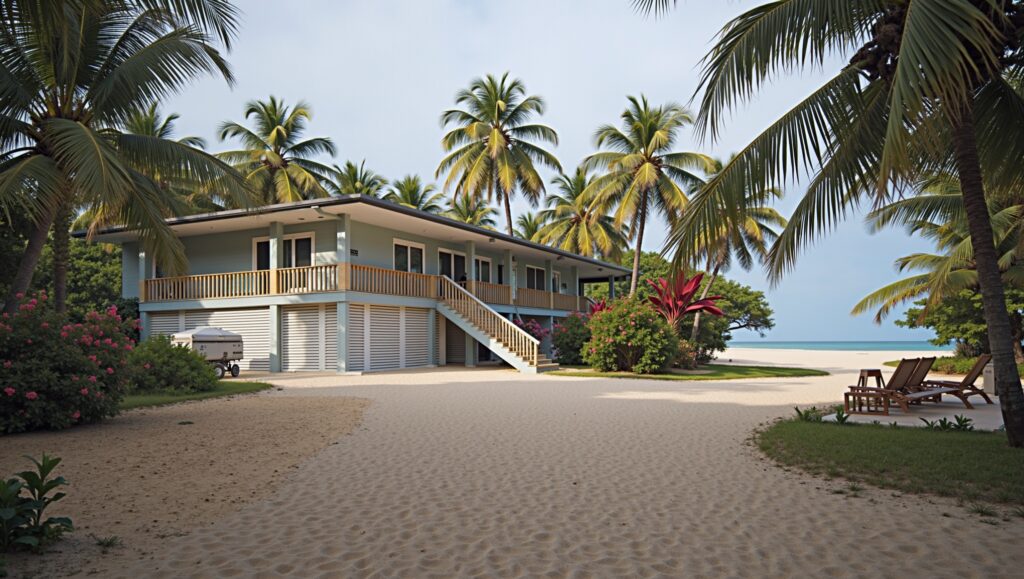Costa Rica has emerged as a hotspot for real estate investments, particularly in the niche of property flipping.
With its breathtaking landscapes, stable economy, and welcoming culture, the Central American nation provides a wealth of opportunities for savvy investors.
This ultimate guide to Costa Rica property flipping offers insight into understanding the local real estate market, pinpointing lucrative investment opportunities, navigating legal aspects, implementing effective renovation strategies, marketing properties for swift sales, and avoiding common pitfalls in the flipping process.
Whether you are a seasoned investor or a first-timer, this comprehensive resource will equip you with the knowledge needed to unlock profits in Costa Rica’s real estate landscape.

Key Takeaways
- The Costa Rica real estate market offers unique opportunities for savvy investors.
- Identifying high-potential properties is crucial for successful flipping in Costa Rica.
- Understanding legal requirements is essential to navigate the property flipping process smoothly.
- Strategic renovations can significantly increase a property’s value and return on investment.
- Avoiding common mistakes can save time and money while optimizing flipping outcomes.
Understanding the Costa Rica Real Estate Market
When exploring the Costa Rica real estate market, it’s essential to understand its unique dynamics, especially if you’re considering ventures like Costa Rica property flipping.
This strategy has gained traction among both local and international investors due to the country’s growing appeal as a destination for retirees, expatriates, and vacationers alike.
Costa Rica’s diverse landscapes, from stunning beaches to lush mountains, provide ample opportunities for flipping properties at varying price points.
With relatively low property prices in comparison to other popular markets and a stable investment climate, savvy investors can capitalize on renovation and resale potential.
Understanding local regulations, property values, and market trends is crucial for anyone looking to succeed in Costa Rica property flipping.
By staying informed, investors can make strategic moves that tap into the burgeoning demand for both permanent residences and vacation rentals.
Identifying Lucrative Investment Opportunities
Investors looking to capitalize on the enticing market of Costa Rica real estate often turn their attention to Costa Rica property flipping as a viable strategy.
This approach involves purchasing undervalued properties in promising locations, renovating them, and subsequently selling them for a profit.
With Costa Rica’s booming tourism sector and growing expat community, areas such as Guanacaste and the Central Valley not only attract buyers but also present significant appreciation potential.
To identify lucrative opportunities, savvy investors should research local market trends, work with experienced real estate agents, and consider properties in up-and-coming neighborhoods.
By understanding the dynamics of the Costa Rican market and leveraging property flipping strategies, investors can reap substantial rewards while contributing to the vibrant growth of this beautiful country.
‘Success is where preparation and opportunity meet.’ – Bobby Unser

Legal Considerations for Property Flipping in Costa Rica
When it comes to Costa Rica property flipping, understanding the legal considerations is crucial for a successful investment.
One of the first steps is to ensure that the property you intend to flip is free of any liens or encumbrances, as these can complicate the sale and potentially eat into your profits.
It’s advisable to engage a local lawyer who specializes in real estate to conduct a proper title search and help navigate the complex legal requirements involved in transferring property ownership.
Additionally, be aware of the zoning regulations and restrictions that may affect your ability to renovate or repurpose the property.
Familiarizing yourself with the tax implications associated with property sales in Costa Rica is also essential, as investors often overlook how capital gains taxes can impact their bottom line.
Furthermore, understanding the national and local regulations governing property transactions will help you avoid legal pitfalls that could derail your Costa Rica property flipping venture.
Proper due diligence and legal compliance can not only protect your investment but also optimize your financial gains in the thriving Costa Rican real estate market.
Effective Renovation Strategies to Maximize ROI
When considering Costa Rica property flipping as a viable investment strategy, effective renovation is key to maximizing your return on investment (ROI).
Firstly, focus on enhancing curb appeal, as the exterior is the first impression potential buyers will have.
Simple landscaping, fresh paint, and minor repairs can significantly elevate the overall aesthetic.
Additionally, prioritize open floor plans and modern designs that appeal to the tastes of both locals and expats; this trend is particularly popular in vacation home markets.
Incorporating energy-efficient upgrades, such as solar panels or better insulation, can also attract eco-conscious buyers while decreasing long-term costs.
Lastly, work with local real estate professionals who understand market demands and can guide you on which renovations yield the best returns in the diverse Costa Rica property market, ensuring your investment flourishes.

Marketing Your Property for Quick Sales
Marketing your property effectively is crucial for anyone looking to engage in Costa Rica property flipping.
In this vibrant real estate market, where opportunities abound for quick turnaround sales, utilizing the right strategies can make all the difference.
Start by showcasing your property with high-quality photographs that highlight its best features, such as stunning ocean views, lush landscapes, or modern amenities.
Invest in professional staging to ensure that potential buyers can visualize the lifestyle that comes with the property.
Utilize social media platforms to reach a wider audience; share captivating posts that tell the story of your property and its location.
Moreover, consider collaborating with a local real estate agent who understands the nuances of the Costa Rican market, enabling you to leverage their network and expertise for a swift sale.
With the right marketing approach, your Costa Rica property flipping venture can be both profitable and enjoyable.
Common Mistakes to Avoid in Property Flipping
When diving into Costa Rica property flipping, it’s essential to be armed with knowledge to avoid common pitfalls that can hinder your success.
One major mistake is underestimating renovation costs; be sure to conduct thorough inspections and research material prices to create a realistic budget.
Additionally, neglecting to understand the local real estate market can lead to poor investment choices — consider working with a local agent who knows the ins and outs of Costa Rica’s various regions.
Another common error is failing to account for hidden costs such as taxes and permits, often overlooked by new investors.
Lastly, don’t rush the selling process; take your time to stage the property properly and market it effectively to attract the right buyers.
By avoiding these mistakes, you can enhance your chances of making profitable returns through Costa Rica property flipping.
Frequently Asked Questions
What is property flipping in Costa Rica?
Property flipping in Costa Rica involves purchasing real estate with the intention of making improvements and reselling it at a higher price for profit.
This process requires knowledge of the local market and renovation strategies to be successful.
What should I know about the Costa Rica real estate market before investing?
Before investing in Costa Rica’s real estate market, it’s essential to understand local trends, property values, and the areas that are experiencing growth.
Researching the market conditions will help you identify lucrative opportunities.
Are there any legal requirements for property flipping in Costa Rica?
Yes, there are specific legal considerations for property flipping in Costa Rica, such as property registration, understanding zoning laws, and adhering to local regulations.
It’s advisable to work with a local real estate attorney to navigate these requirements.
What renovation strategies can maximize my return on investment?
To maximize your ROI in property flipping, focus on renovations that improve aesthetics and functionality, such as modernizing kitchens and bathrooms, enhancing curb appeal, and making energy-efficient upgrades that appeal to potential buyers.
What common mistakes should I avoid when flipping properties in Costa Rica?
Common mistakes in property flipping include underestimating renovation costs, failing to conduct thorough market research, overlooking legal requirements, and pricing the property incorrectly.
Careful planning and due diligence can help you avoid these pitfalls.





